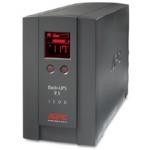Uninterruptible Power Supplies (UPS)
 An Uninterruptible Power Supply (UPS) provides a battery (or in big installations, a generator) backup in case of power failure. Thus, in the event of a power failure, it is possible to continue working. Smaller units are designed to provide a few minutes of battery powered operation, just enough time to shut down the computer properly; others allow extended operation off-grid.
An Uninterruptible Power Supply (UPS) provides a battery (or in big installations, a generator) backup in case of power failure. Thus, in the event of a power failure, it is possible to continue working. Smaller units are designed to provide a few minutes of battery powered operation, just enough time to shut down the computer properly; others allow extended operation off-grid.
Why use a UPS?
- It prevents loss of data if a power cut occurs when files are being written to disk,
- UPS' usually also contain a surge protector, thus preventing damage to hardware caused by voltage spikes (e.g., from lightning strikes on power lines), and
- Larger UPS' allows one to continue to work in case of a power cut.
What to Look For
Here are a few items to look for when purchasing a UPS.
- The UPS should output a proper sine-wave; AVOID any devices that output square-waves or "modified sine-waves,"
- Check that the manufacturer provides a Warrantee against hardware damage (e.g., will replace damaged equipment up to $100,000 if the UPS fails to protect it,
- The device's power rating should exceed the total power required by all devices that are attached to it,
- Units with Automatic Voltage Regulation (AVR) can boost low voltage and trim high voltage without switching to batteries (increases battery life), and
- If you have a modem (DSL or dialup) or cable connection, choose a unit with a phone/cable surge protector socket.
Recommended UPS Units
I have personally used both APC and Belkin UPS' and both of these companies make high quality UPS'. A higher VA rating is better, but also more expensive. A 1500 VA UPS should be more than enough for a typical PC.
IMPORTANT: Those who buy an APC UPS should buy an RS model, not one of the others, since the RS model has AVR and the others do not.
Surge Protectors
Every year, lightning strikes or other problems damage computer equipment. A surge protector prevents voltage spikes from making it through to the computer hardware, thus reducing the risk of damaged hardware. Whilst UPS' usually have these built in, these do come in handy with laptops, for which a UPS is overkill (the laptop's own battery works like a UPS). When looking for a UPS, keep the following in mind:
- The power rating should exceed the total power required by all devices attached,
- If you have a modem (DSL or dialup) or cable internet connection, choose a unitp with a phone/cable socket,
- Beware that some cheap surge protectors are "one-shot" devices, that is, they may protect your hardware, but must be replaced after a surge, and
- A quality surge protector will come with a warrantee against damaged hardware, at least up to $20,000 worth of equipment.
Once again, APC and Belkin make quality surge protectors, although they are not the only ones. Beware of cheap devices; they may or may not work when they are actually needed. Moreover, if a manufacturer does not provide a warrantee/guarantee against damage, then they cannot have much trust in their own product; likewise, you should not either.
Articles » Protecting Hardware and Data » Uninterruptible Power Supplies (UPS)
